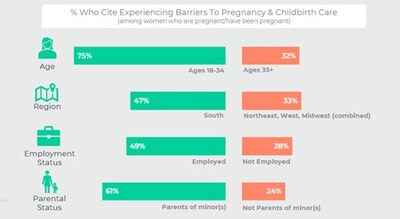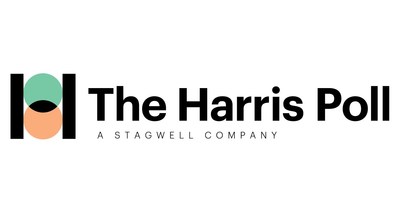More than half of U.S. women feel like they have to fight to get the medical care they need
New Survey by Stagwell (STGW)'s The Harris Poll Reveals Urgent Concerns Regarding Access and Quality of Maternal Healthcare in the U.S.
NEW YORK, June 21, 2024 /PRNewswire/ -- The Harris Poll, a Stagwell Agency, recently released its second annual State of Maternal Health Report, highlighting alarming challenges around maternal healthcare in the United States. With the 2nd anniversary of the Supreme Court's Dobbs decision overturning Roe v. Wade approaching, the survey results are even more striking - revealing significant disparities in the care pregnant women receive and their experiences with the healthcare system.
The survey, conducted online in April of 2024 among more than 1,000 U.S. women aged 18+, identified that a worrying proportion of women believe they must fight to receive the medical care they need, with more than half of women (53%) agreeing with this sentiment. Furthermore, roughly 2 in 5 women who are pregnant or have been pregnant (39%) say they experienced challenges to accessing care during pregnancy and childbirth. Access to care issues appear even more pronounced among younger women aged 18-34 (who are most likely to have recently experienced pregnancy or to be currently pregnant), women residing in the South, employed women, and mothers with children under 18.
Not being able to access such important care can negatively impact the entire pregnancy journey, from experiences to outcomes. Other findings from the survey surrounding care quality include:
- Only 42% of women who are currently pregnant/have ever been pregnant strongly feel they had access to the best possible care when they were pregnant—a significant drop from 50% in 2022.
- Younger women are particularly affected, with less than a third in the 18-34 age group (32%) strongly feeling they received the best possible care.
- More than 1 in 10 women who have been pregnant say their prenatal care (11%), labor care (12%), and delivery care (12%) were less than adequate. About 1 in 7 (15%) say the same of their recovery care, and a whopping 1 in 4 (24%) say the same of their postpartum care.
- About 1 in 7 women who've been pregnant (14%) did not feel heard by their provider during their prenatal care visits.
"The data clearly show that not only are many women feeling disregarded and underserved by our healthcare system during one of the most vulnerable times in their lives, but there is also an overwhelming demand for immediate improvements to ensure the safety and well-being of all mothers in America," said Christina Lojek, Research Manager, The Harris Poll. "Furthermore, the results confirm that access to care and care quality issues are becoming more prevalent, and depending on which state you live in, you could be more at risk," she stated.
Notably, two-thirds of women (67%) expressed concerns that the current political climate is exacerbating the risks associated with pregnancy and childbirth, and perhaps rightfully so. Women across the U.S. are demanding change - a vast majority (83%) state that more needs to be done to ensure safer pregnancy and birthing conditions in the U.S., with 45% strongly endorsing this view.
When thinking about access and quality of care in the current political environment, location matters. Looking at women who live in states with the most restrictive reproductive health policies*, they are significantly more likely than those who live in protective states to share negative experiences and sentiments surrounding pregnancy and childbirth care:
- Women in the most restrictive states are significantly more likely to feel like they have to fight to get the medical care they need than women who live in protective states (58% vs. 49%).
- Among women who are currently pregnant/have ever been pregnant:
- Those in the most restrictive states are significantly less likely to strongly feel they had access to the best possible care when pregnant than those who live in protective states (38% vs. 50%).
- Nearly half of those in the most restrictive states (48%) say they experienced challenges to accessing care during pregnancy and childbirth, compared to less than a third (31%) of those in protective states, and are about twice as likely to report insurance-related barriers (20% vs. 11%).
- Among women who have been pregnant:
- Those in the most restrictive states are more than twice as likely as those in protective states to cite less than adequate prenatal (17% vs. 7%) and labor (19% vs. 9%) care.
- Those in the most restrictive states are twice as likely to say they did not feel heard by their provider during prenatal care visits as women who live in protective states (20% vs. 9%), and more than 4 times as likely to strongly feel this way (9% vs. 2%).
In light of these findings, there is a clear call to action for healthcare providers, policymakers, and community leaders to take decisive measures towards reforming maternal healthcare practices and policies. Ensuring that all pregnant women have access to the highest standard of care needs to be an urgent public health priority.
*Definitions for states' reproductive health policies were derived from Guttmacher Institute. Most restrictive states include Alabama, Arkansas, Florida, Idaho, Indiana, Kentucky, Louisiana, Mississippi, Missouri, North Dakota, Oklahoma, South Carolina, South Dakota, Tennessee, Texas, and West Virginia. Protective states include Alaska, California, Colorado, Connecticut, District of Columbia, Hawaii, Illinois, Maine, Maryland, Massachusetts, Michigan, Minnesota, Montana, New Jersey, New Mexico, New York, Oregon, Vermont, and Washington.
Survey Method:
The 2024 State of Maternal Health survey was conducted online in the U.S. by The Harris Poll April 2-4, 2024 among 2,061 U.S. adults ages 18+, among whom 1,116 are women, and 701 are women who are currently pregnant or have ever been pregnant. The sampling precision of Harris online polls is measured by using a Bayesian credible interval. For this study, the sample data is accurate to within +/- 2.5 percentage points using a 95% confidence level. This credible interval will be wider among subsets of the surveyed population of interest. For complete survey methodology, including weighting variables and subgroup sample sizes, please contact christina.lojek@harrispoll.com.
About The Harris Poll
The Harris Poll is a global consulting and market research firm that strives to reveal the authentic values of modern society to inspire leaders to create a better tomorrow. It works with clients in three primary areas: building twenty-first-century corporate reputation, crafting brand strategy and performance tracking, and earning organic media through public relations research. One of the longest-running surveys in the U.S., The Harris Poll has tracked public opinion, motivations and social sentiment since 1963, and is now part of Stagwell, the challenger holding company built to transform marketing. To learn more, please visit www.theharrispoll.com
Contact:
Christina Lojek
christina.lojek@harrispoll.com
![]() View original content to download multimedia:https://www.prnewswire.com/news-releases/more-than-half-of-us-women-feel-like-they-have-to-fight-to-get-the-medical-care-they-need-302179167.html
View original content to download multimedia:https://www.prnewswire.com/news-releases/more-than-half-of-us-women-feel-like-they-have-to-fight-to-get-the-medical-care-they-need-302179167.html
SOURCE Stagwell Inc.


